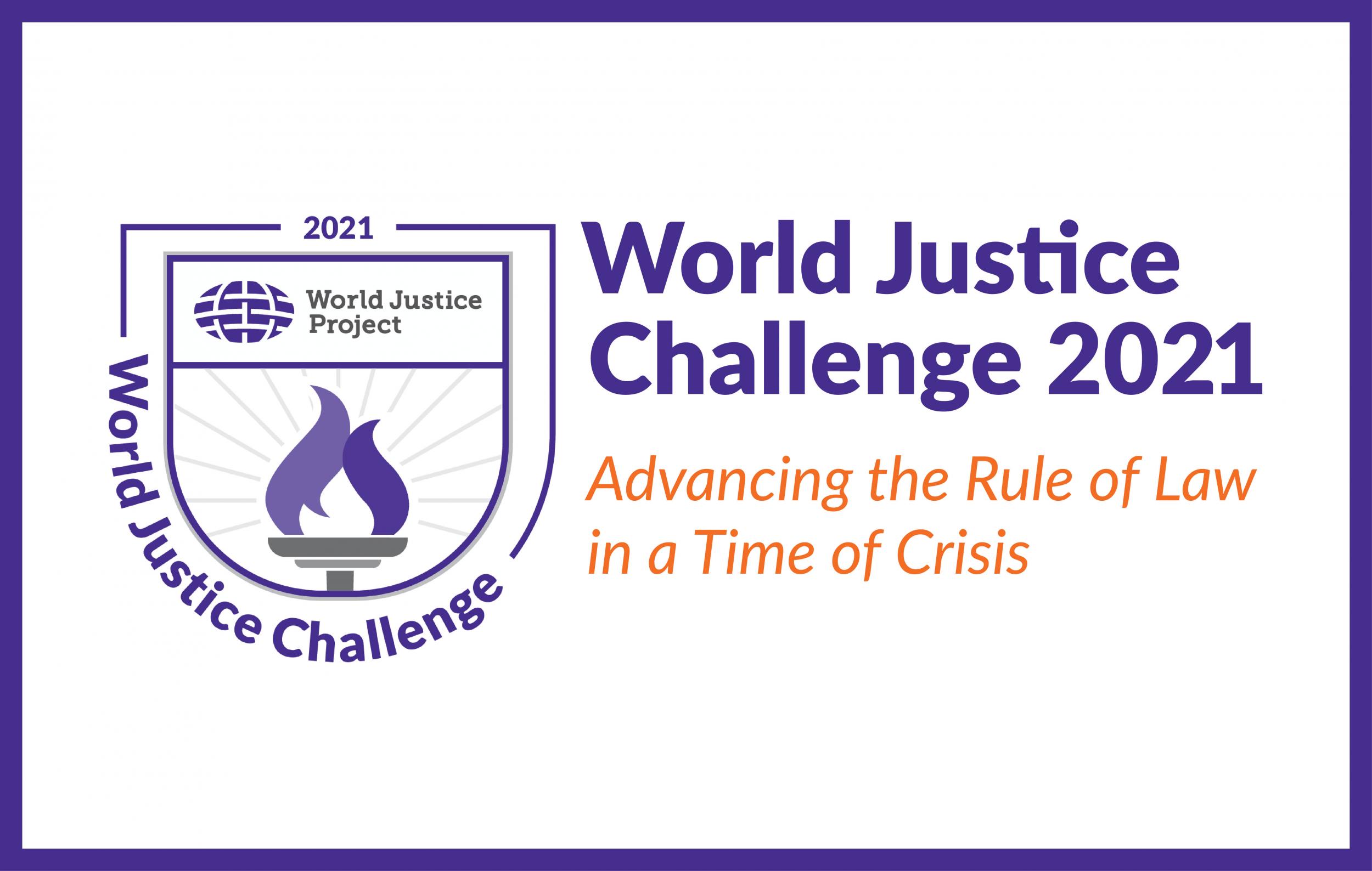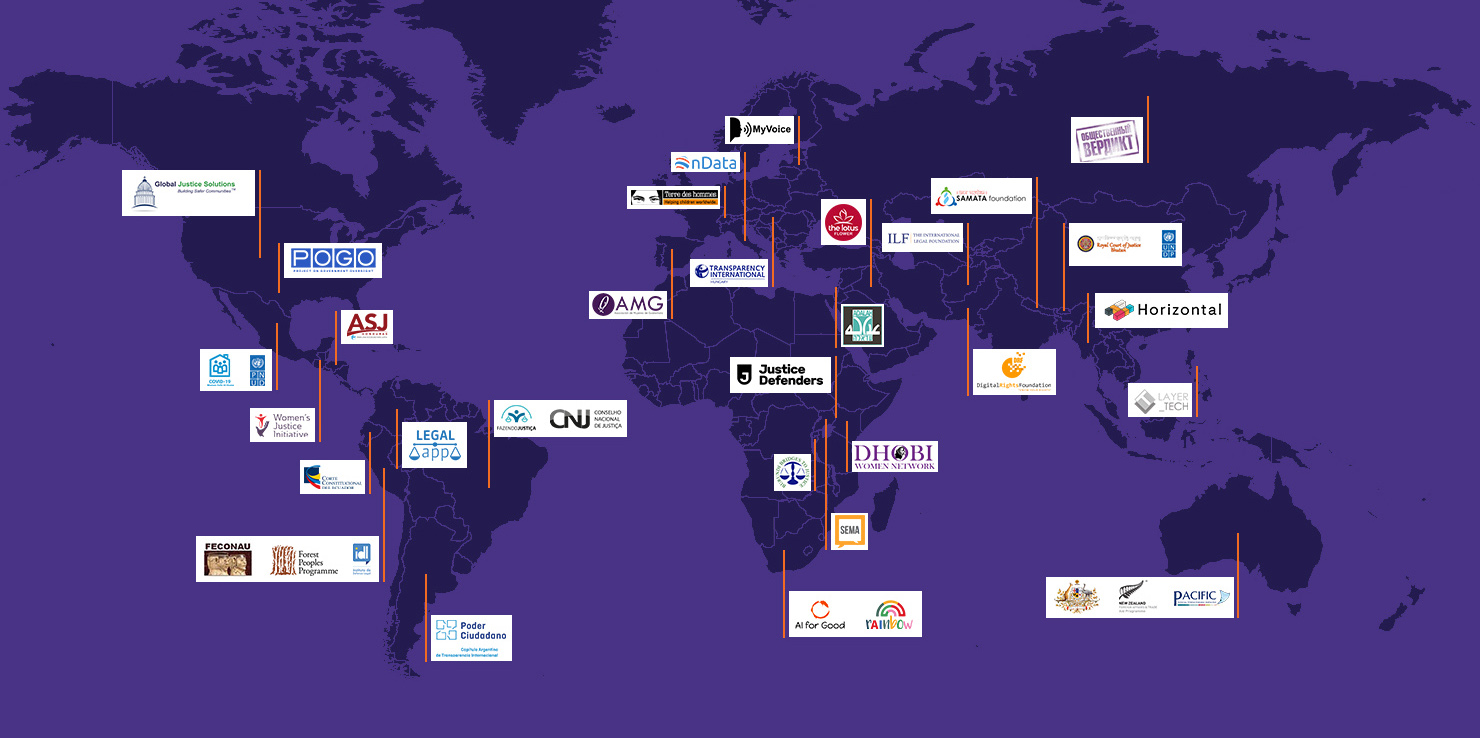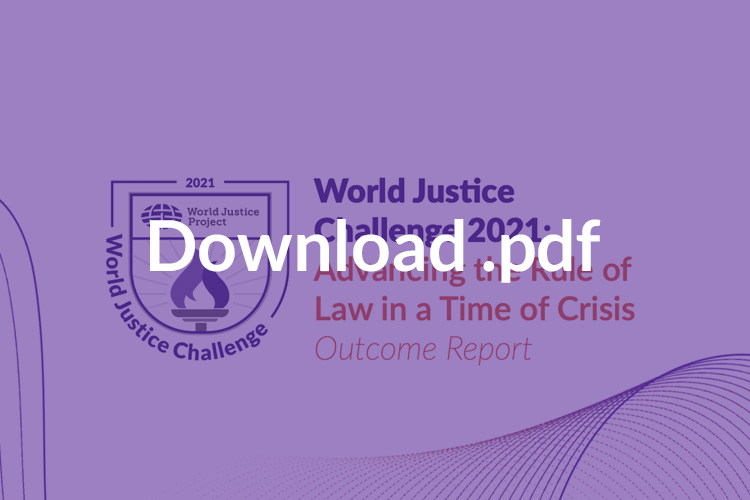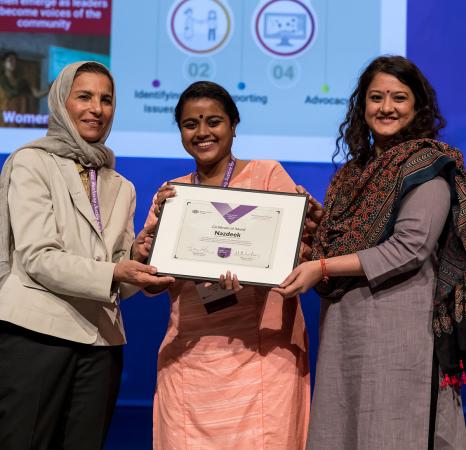2021 World Justice Challenge Winners and Finalists
In April 2021, The World Justice Project (WJP) was pleased to announce six winners in the World Justice Challenge 2021: Advancing the Rule of Law in a Time of Crisis competition. In response to the COVID-19 pandemic, the 2021 World Justice Challenge sought to identify, recognize, and promote good practices and high-impact projects and policies that protect and advance the rule of law in this time of unprecedented crisis.
Selected from a pool of 30 finalists and 425 submissions from 114 countries, each winning project was awarded $20,000 USD for their work to protect and advance the rule of law in the face of COVID-19 challenges.
In announcing the winners, WJP Executive Director Elizabeth Andersen said:
"The COVID-19 pandemic struck the world in the midst of a growing rule of law crisis, as documented in WJP's own research, and has underscored the importance of a just and inclusive recovery". "That is why we wanted to shine a light on effective and innovative ways to tackle the governance challenges posed and exacerbated by this ongoing pandemic. The promising approaches shown by these six winning projects, and indeed by all 30 Challenge finalists, serve as a guiding light to changemakers the world over. We are honored to recognize their work and pleased to welcome them to the WJP network."
Meet the 2021 Challenge Winners:
The 2021 World Justice Challenge's four thematic winners represent best-in-class projects under the themes of Access to Justice for All, Accountable Governance, Anti-Corruption and Open Government, and Fundamental Rights and Non-Discrimination. In addition, two special awards recognized winners for the Ruth Bader Ginsburg Legacy Prize and the WJP Network Popular Vote. The six winners are:
Winner — Access to Justice for All
Increasing Access to Justice and Providing Legal Education Through Online Learning Platforms and Virtual Courts
Justice Defenders (Kenya/Uganda/Gambia)
This project aims to make justice and fair trial accessible to prisoners in Africa through legal education, training, and practice.
- The COVID-19 pandemic has significantly worsened an already serious global gap in access to justice. In 2019, prior to the pandemic, WJP's research estimated that 5.1 billion people globally have unmet justice needs. These numbers have certainly worsened due to the pandemic.
- The project was selected for its impressive example of empowering prisoners and prison staff through legal training and education and facilitating access to the courts during the pandemic.
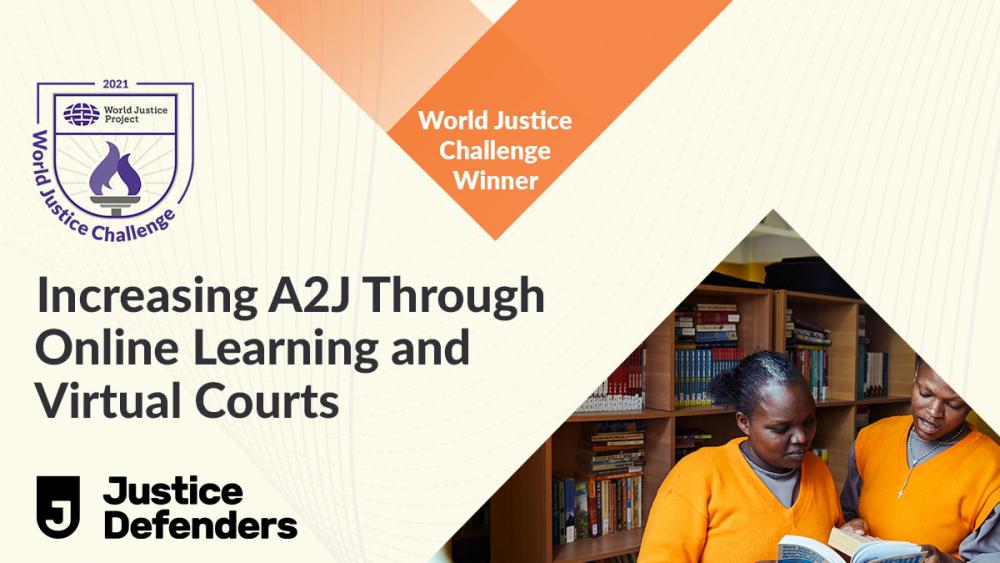
Winner — Accountable Governance
Tella
Horizontal (US/Global/Myanmar/Belarus)
Tella is a documentation app that makes it easier and safer to document events such as human rights violations, corruption, and electoral fraud.
- During the COVID-19 pandemic, the world witnessed a dramatic increase in the use of emergency powers, the diminished ability of legislatures and judiciaries to operate, disrupted electoral processes, and the shrinking of political space for civil society organizations and the media to check executive power.
- The project was selected for its promise as a versatile, secure and customizable tool for documenting government abuses and holding governments accountable.
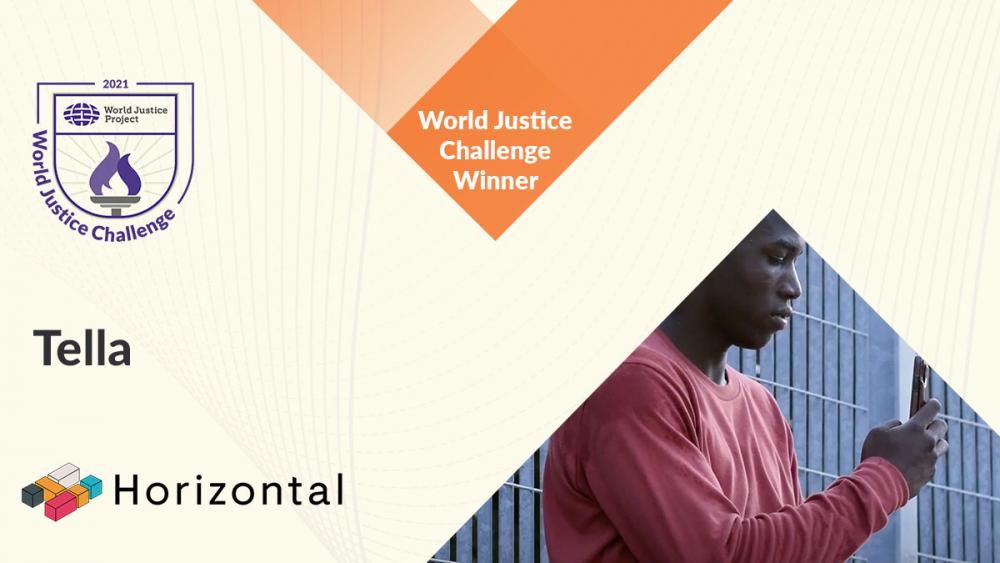
Winner — Anti-Corruption and Open Government
Constructing Transparency: Promoting Justice in Honduras Through Good Governance and Strong Public Management
Asociación para una Sociedad más Justa (ASJ) (Honduras)
This project combats systemic corruption in Honduras by evaluating government institutions' human resources, purchases, and results.
- The COVID-19 pandemic gave rise to significant corruption risks. Governments mobilized massive resources to respond to the health and economic crises. At the same time, many governments enacted emergency procurement procedures and suspended corruption prevention and enforcement mechanisms. Each of these measures increased the risk for corruption and waste. This corruption risk was a rule of law problem in itself. It also compromised the pandemic response, undermined much-needed trust in public institutions, squandered supplies and resources, and impeded their flow to those in need.
- The project was selected for its strong example of an investigation, led by civil society, that produced specific, concrete results with government agencies, widespread media coverage, and prosecutions of corrupt actors. The project’s ability to work across multiple stakeholders and garner media coverage was impressive in producing a strong, tangible impact.
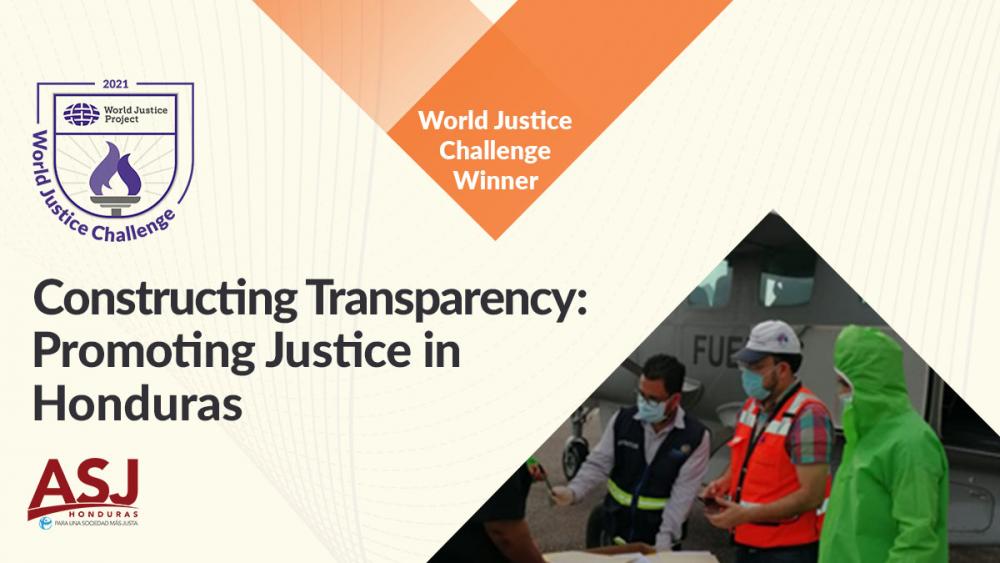
Winner — Fundamental Rights and Non-Discrimination
COVID-19 Project: Demanding Equal Treatment and Non-Discrimination for the Arab Minority Through the Israeli Legal System
Adalah - The Legal Center for Arab Minority Rights in Israel (Israel)
This project uses legal action before Israeli courts and state authorities, together with media outreach, to obtain remedies for discrimination faced by the Arab minority in Israel.
- According to the 2020 World Justice Project Rule of Law Index, more countries have regressed on their 'fundamental rights score' than any other rule of law factor over both 2019-2020 and the last five years. In addition to the dramatic effects of quarantines and lockdowns on freedom of movement and travel, the pandemic affected human rights in four areas of particular concern: equal treatment and non-discrimination, freedoms of expression and assembly and right to information, right to privacy, and due process and the rights of detainees.
- The project was selected for its effectiveness in using legal remedies to address the discriminatory effects of the pandemic crisis, leading to significant results in the struggle for fundamental human rights and non-discrimination of Arab minorities in Israel.
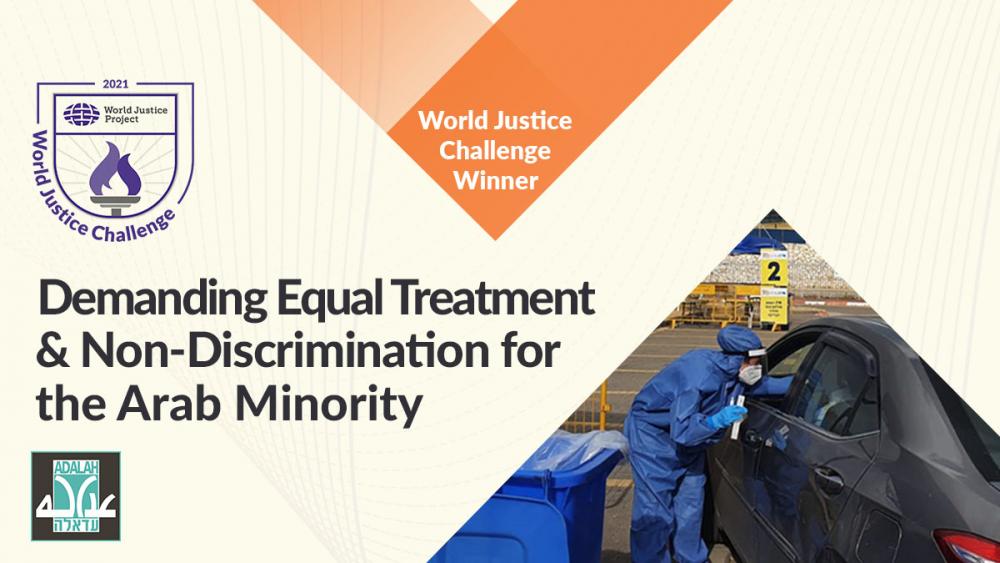
Winner — Ruth Bader Ginsburg Legacy Prize
Inua Mama Fua
Dhobi Women Network (Kenya)
This project defends the rights of women domestic workers working in the suburbs of Nairobi.
- The new Ruth Bader Ginsburg Legacy Prize is awarded to the finalist project that best exemplifies the fight against inequality and gender-based discrimination. This prize honors former U.S. Supreme Court Justice Ginsburg's lifelong work in service to the causes of justice, equality, and the rule of law, and in recognition of her tremendous inspiration to WJP's mission and work.
- The project was selected as an important example of a multifaceted approach to the fight against inequality and gender-based discrimination through provision of emergency social services and raising awareness of these women’s rights to decent work.
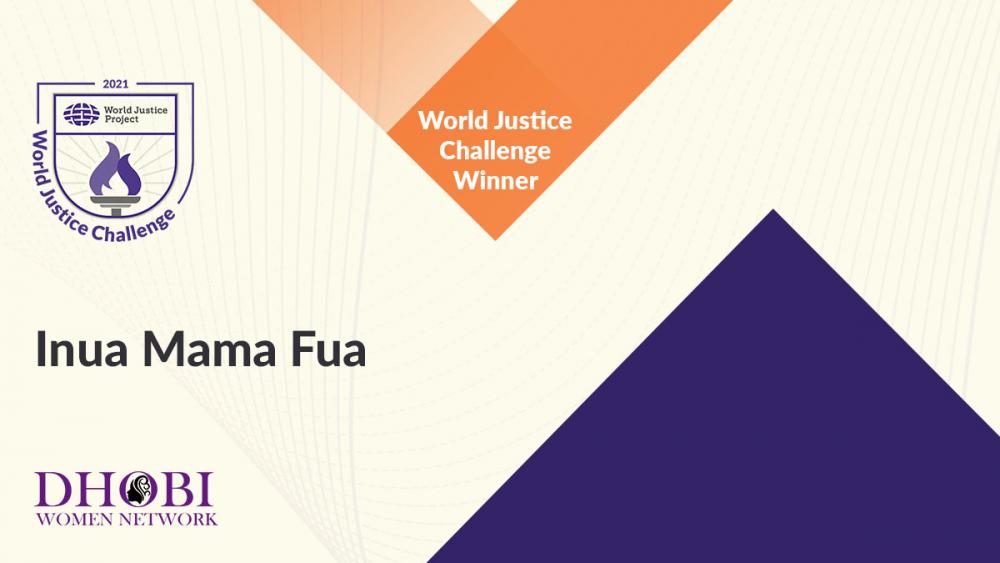
Winner — WJP Network Popular Vote
Accelerate Release of Children; Protect Children from COVID-19
Terre des Hommes Foundation (Switzerland/Global)
This project is dedicated to building rapid knowledge and mobilizing interdisciplinary partnerships to foster a global advocacy campaign with a swift, targeted, and effective impact for children deprived of liberty.
- The WJP Network Popular Vote prize is selected for its inspiration and impact by WJP's network. Over 1,400 voters registered for a ballot through our World Justice Challenge Community Forum Platform.
- This project led to the emergency release and reintegration care of hundreds of children worldwide.
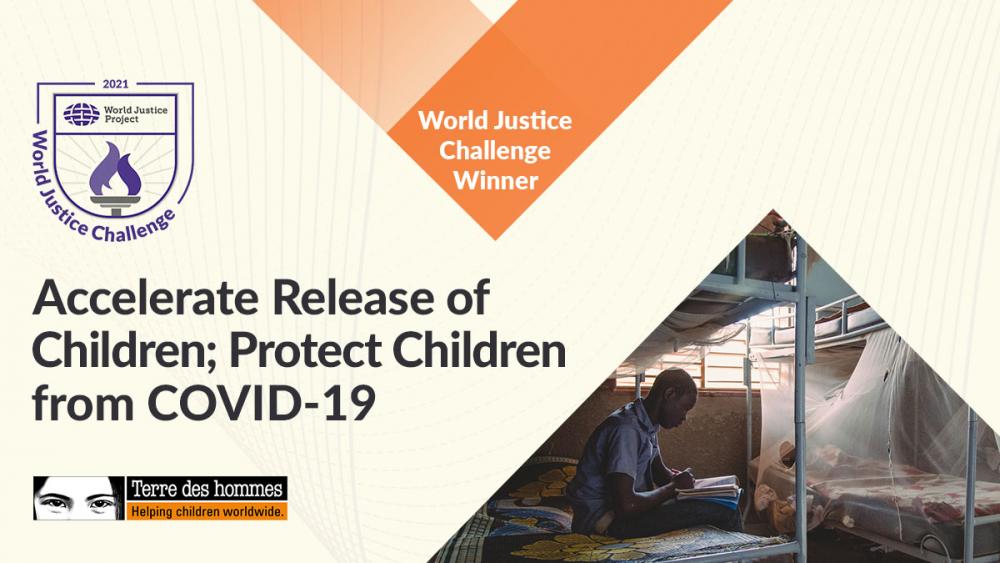
Meet all the 2021 Challenge Finalists:
WJP and its thematic partners selected 30 finalists for their demonstrated impact in advancing the rule of law in four thematic areas affected by the COVID-19 pandemic: access to justice for all, accountable governance, fundamental rights and non-discrimination, and anti-corruption and open government. In addition to the finalists below, an additional ten projects were chosen as Honorable Mentions.
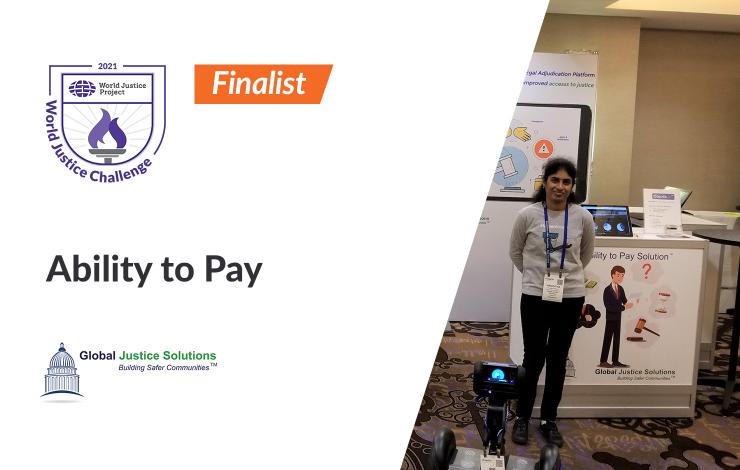
Global Justice Solutions | United States
Access to Justice for All
-
Ability to Pay is an online platform that allows indigent defendants with a legal financial obligation to request alternative sanctions instead of facing incarceration because they are unable to pay their fines and fees.
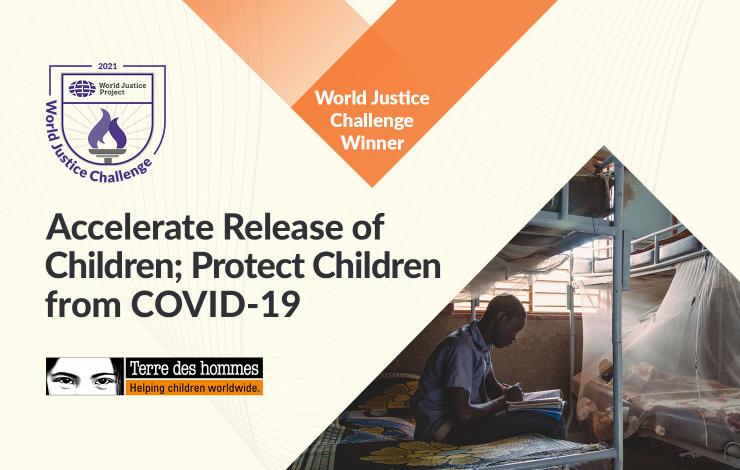
Terre des Hommes Foundation | Switzerland/Global
Fundamental Rights and Non-Discrimination
-
Immediately following the outbreak of COVID-19 worldwide, Terre des Hommes launched a project dedicated to building rapid knowledge and mobilizing interdisciplinary partnership to foster a global advocacy campaign with a swift, targeted, and effective impact for children deprived of liberty.
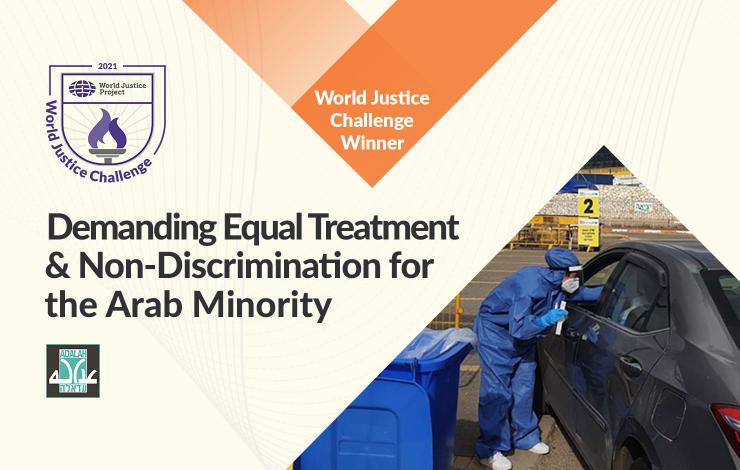
Adalah - The Legal Center for Arab Minority Rights in Israel | Israel
Fundamental Rights and Non-Discrimination
-
Adalah's Emergency COVID-19 project uses legal action before Israeli courts and state authorities, together with media outreach, to obtain remedies for discrimination faced by the Arab minority, around 20% of the population of Israel.
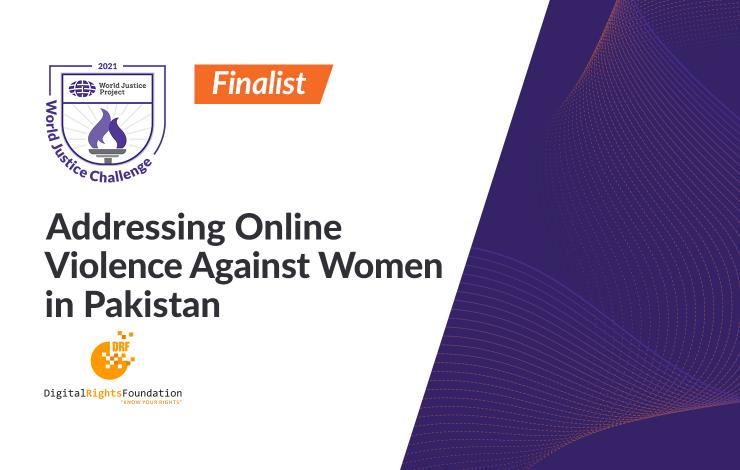
Digital Rights Foundation | Pakistan
Access to Justice for All
-
This project seeks to address gender-based violence in online spaces within Pakistan through a holistic approach by providing services in the form of the cyber harassment helpline and consciousness building regarding this emerging form of violence in the country.
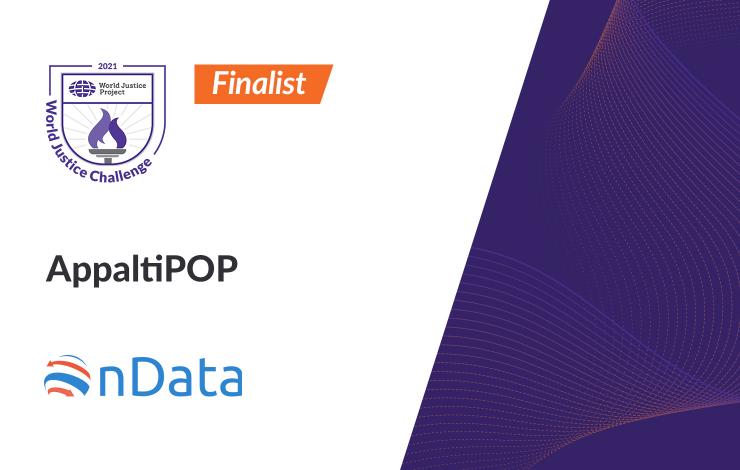
OnData.it | Italy
Anti-Corruption and Open Government
-
AppaltiPOP is a new open data platform that aims to increase transparency and competitiveness in public procurement in Italy.
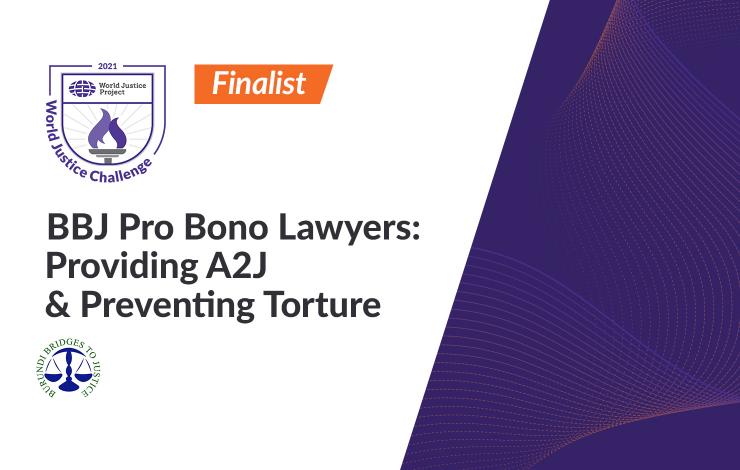
Burundi Bridges to Justice (BBJ) | Burundi
Fundamental Rights and Non-Discrimination
-
Amidst Burundi’s widespread human rights abuses and COVID-19, Burundi Bridges to Justice (BBJ) is a pioneering human rights organization that provides thousands of vulnerable accused individuals with early access to pro bono legal counsel.
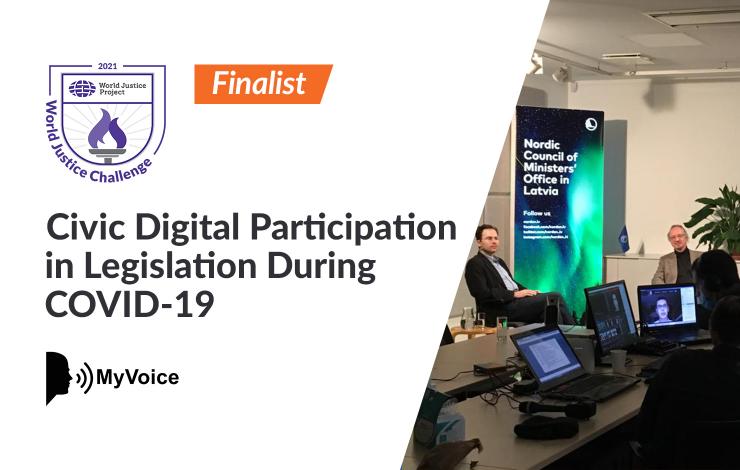
Foundation for Public Participation (Sabiedrības Līdzdalības Fonds) | Latvia
Accountable Governance
-
In 2020, building on robust and highly efficient civic digital participation achievements, public participation CSO MyVoice (ManaBalss) has provided high-impact digital participation services to civic society in Latvia.
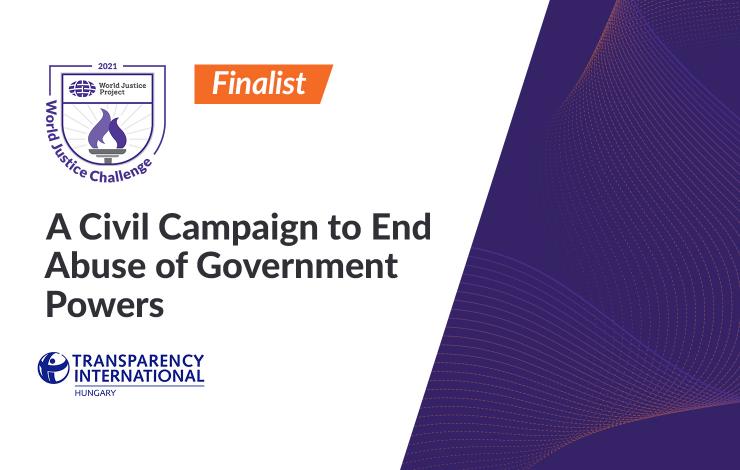
Transparency International Hungary Foundation | Hungary
Anti-Corruption and Open Government
-
Transparency International Hungary is determined to challenge the abuse of special powers afforded to the government with the excuse of containing the COVID-19 pandemic.
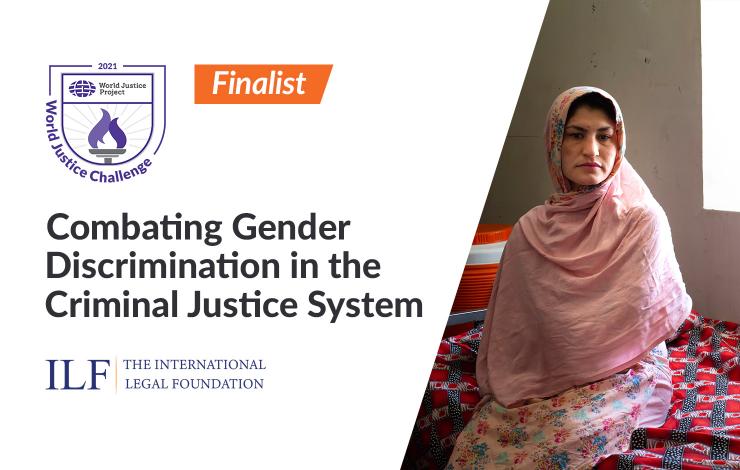
The International Legal Foundation | Afghanistan
Fundamental Rights and Non-Discrimination
-
This project seeks to ensure that formerly incarcerated women and girls in Afghanistan—including hundreds released pursuant to COVID-19 amnesty decrees—are provided with a safe and successful transition to their communities.
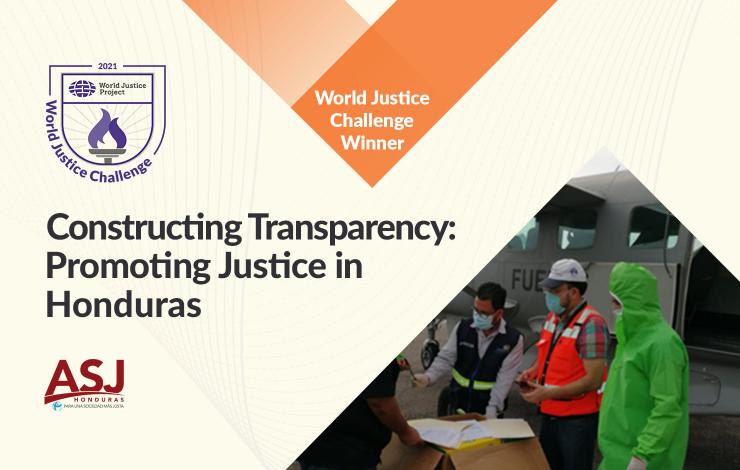
Asociación para una Sociedad más Justa (ASJ) | Honduras
Anti-Corruption and Open Government
-
The Constructing Transparency project combats systemic corruption in Honduras by evaluating government institutions' human resources, purchases, and results.
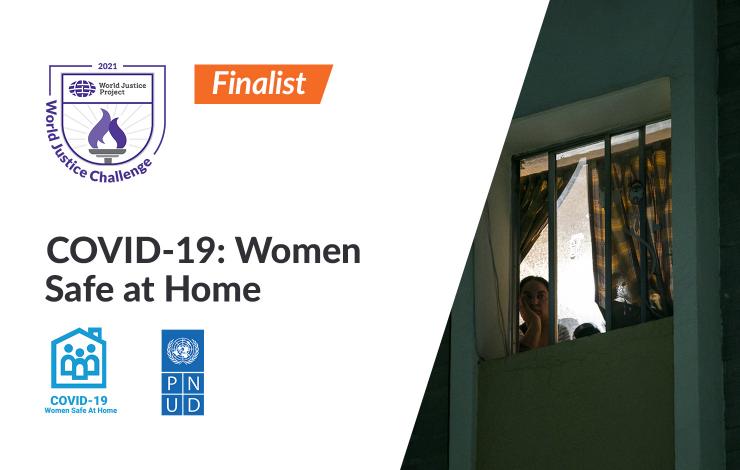
UNDP Mexico | Mexico
Access to Justice for All
-
The COVID-19: Women Safe at Home project focuses on preventing and addressing violence against women in Mexico City, a public health problem exacerbated by the COVID-19 pandemic containment measures.

SEMA | Uganda
Anti-Corruption and Open Government
-
SEMA drives accountability for public services by offering a real-time citizen feedback mechanism for the public sector.
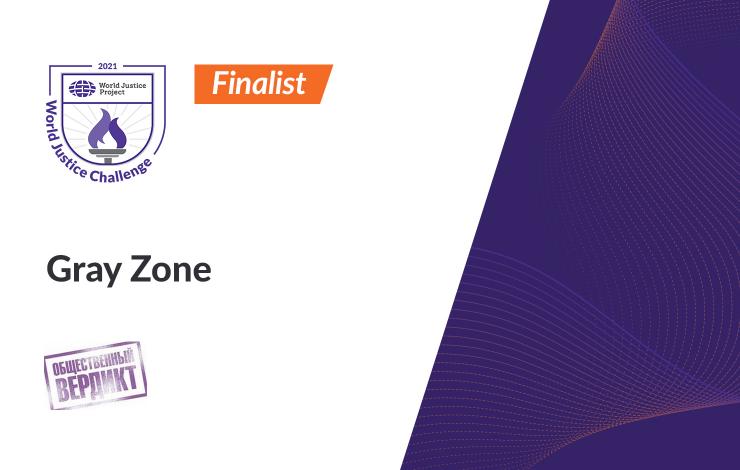
Public Verdict Foundation | Russia
Accountable Governance
-
This project includes an interactive map and legal assistance attached to it. A digital map reflecting each COVID case reported by either convicts or their relatives is used by lawyers and human rights defenders to file inquiries demanding action on the part of the administration.
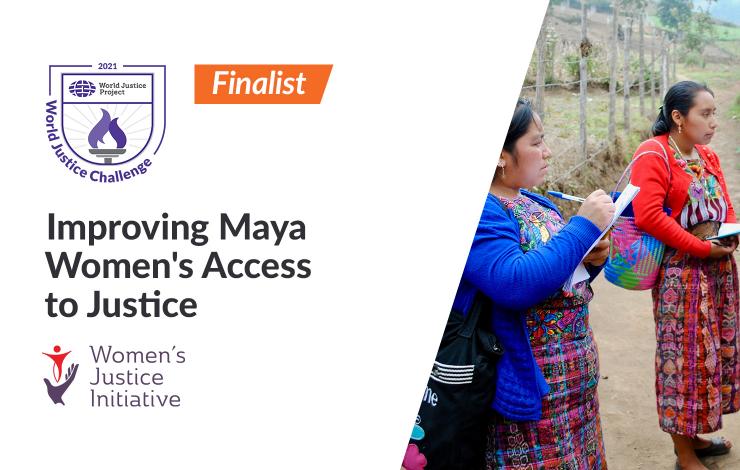
Women's Justice Initiative | Guatemala
Access to Justice for All
-
The Women's Justice Initiative (WJI) works to prevent gender-based violence and improve the lives of indigenous Guatemalan women and girls through education, access to legal services, and by strengthening public institutions.
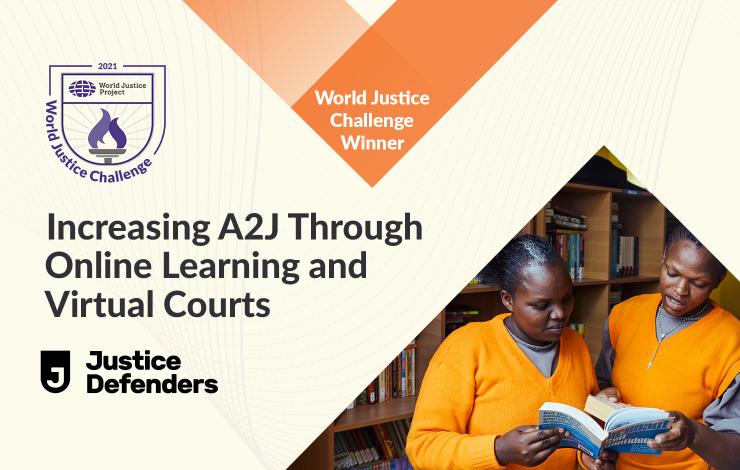
Justice Defenders | Kenya/Uganda/Gambia/Regional
Access to Justice for All
-
Justice Defenders aims to make justice and fair trial accessible to prisoners in Africa through legal education, training, and practice.
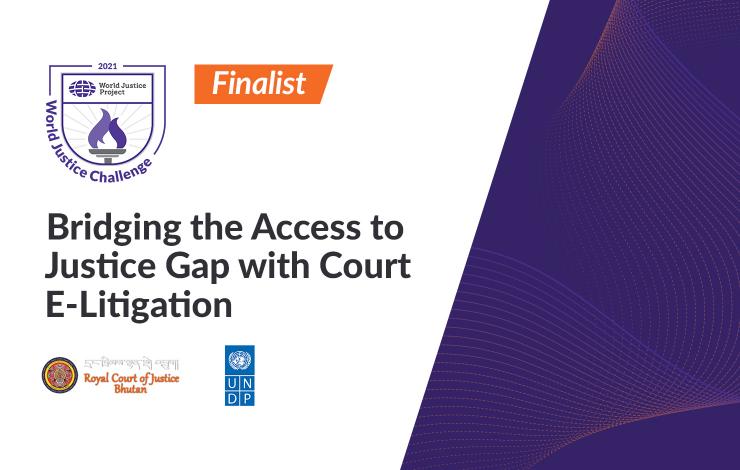
UNDP Bhutan | Bhutan
Accountable Governance
-
The Judiciary of Bhutan initiated an e-litigation project in 2020 as part of their response to the COVID-19 pandemic to ensure continued justice delivery to citizens.
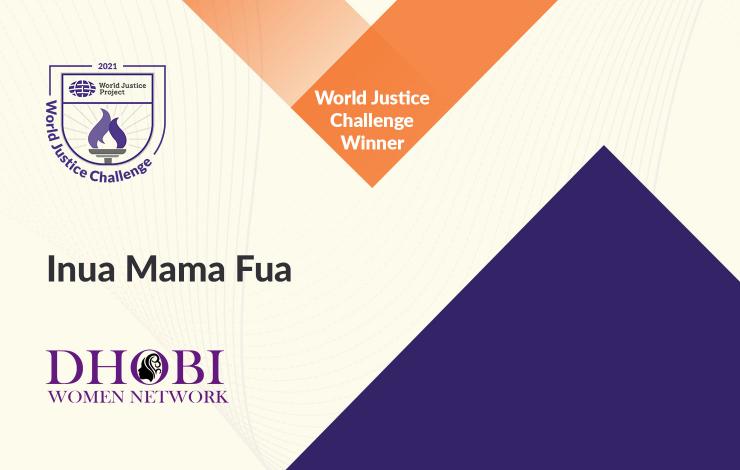
Dhobi Women Network | Kenya
Fundamental Rights and Non-Discrimination
-
This project protects the rights of women domestic workers working within the suburbs of Nairobi and who are currently unable to fend for themselves due to the ongoing pandemic that saw their employers send them home.
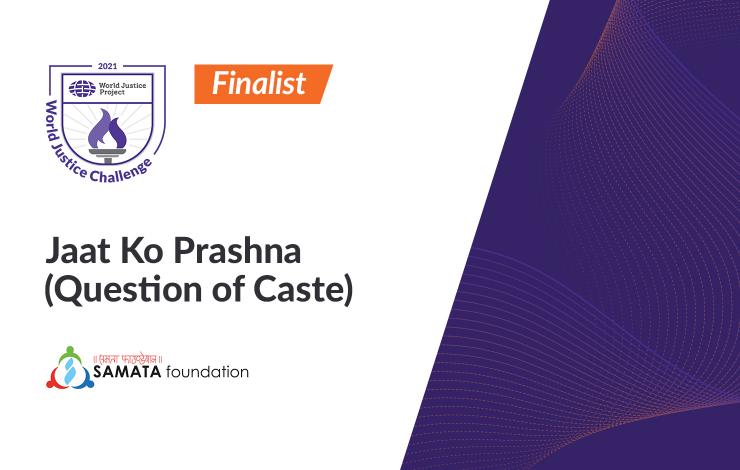
Samata Foundation | Nepal
Fundamental Rights and Non-Discrimination
-
Jaat ko Prashna, a television program, addressed deeply rooted caste-based discrimination and violence in Nepal.

Colombia Ministry of Justice | Colombia
Access to Justice for All
-
LegalApp is a free consultation web tool that uses simple language that is easy for citizens to understand, offering information on how to carry out formalities, procedures, or "justice routes" for conflict resolution.
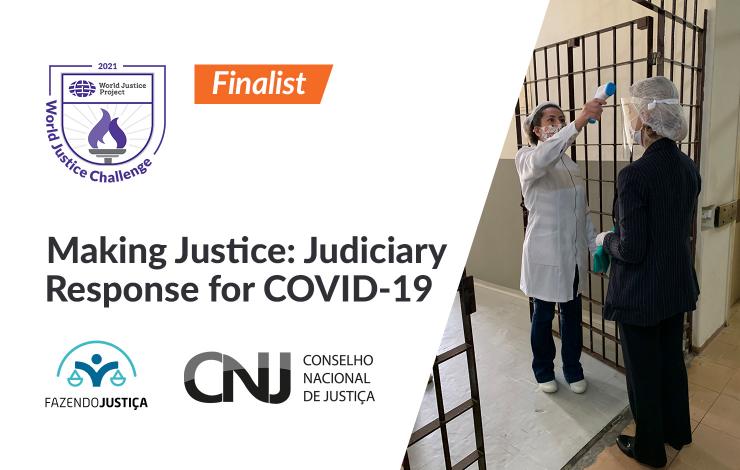
Conselho Nacional de Justiça - CNJ | Brazil
Accountable Governance
-
Recommendation 62, approved by CNJ in March 2020, establishes guidelines to State Courts and judges to take preventive measures against the spread of the COVID-19, especially among confined populations.
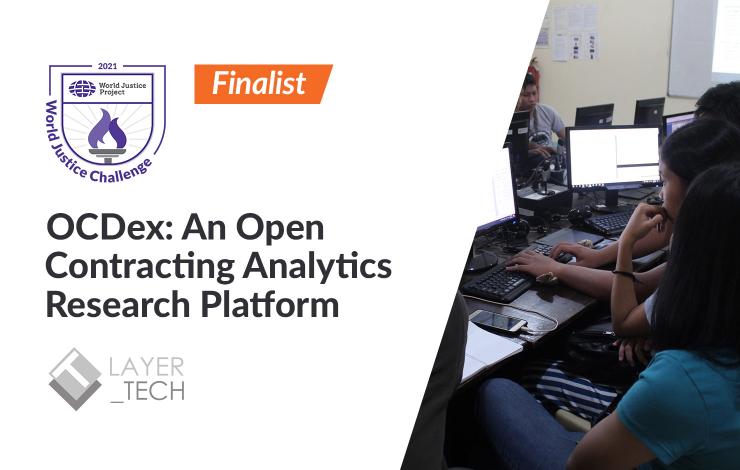
Layertech Software Labs, Inc | Philippines
Anti-Corruption and Open Government
-
From 2018-2020, Layertech led Project OCDex, an inspection of Philippine procurement data to inform stakeholders of government procurement and contracts.
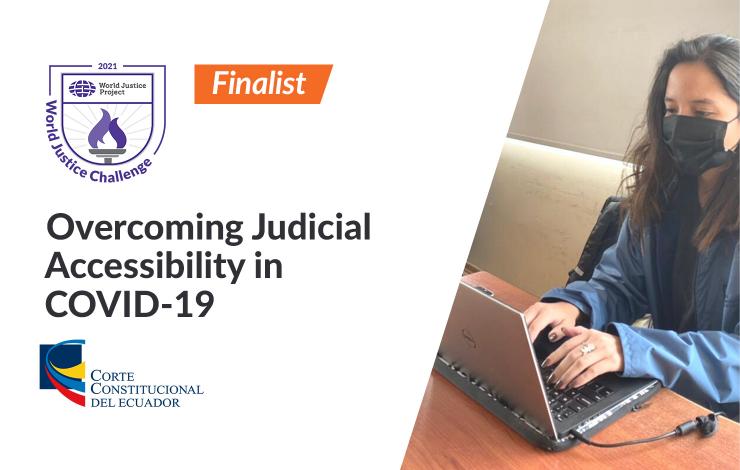
Constitutional Court of Ecuador | Ecuador
Accountable Governance
-
The Constitutional Court developed and implemented the SACC (Automatized System of the Constitutional Court) whose main objective is to address judicial accessibility, enhance transparency, and improve efficiency when delivering constitutional justice.
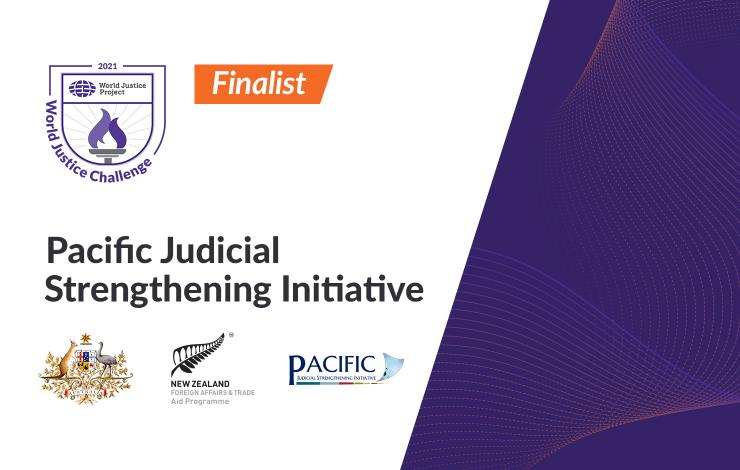
Federal Court of Australia | Pacific Region
Accountable Governance
-
When COVID-19 locked-down the world in early 2020, PJSI immediately redesigned its program to support the new and urgent needs of Pacific courts.
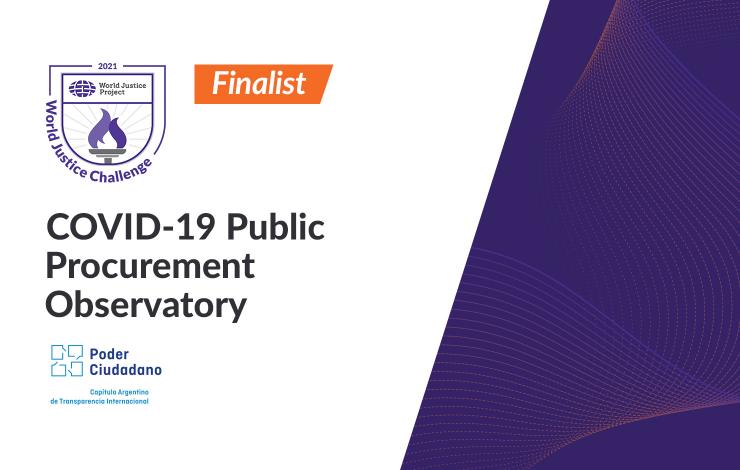
Poder Ciudadano | Argentina
Anti-Corruption and Open Government
-
Poder Ciudadano created the Public Procurement Observatory COVID-19 with the aim of improving the integrity of public procurement based on parameters of open information, transparency, and accountability.
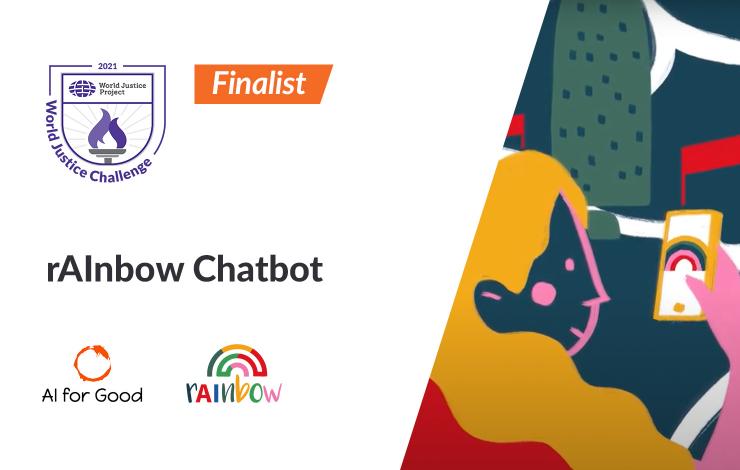
AI for Good | South Africa/Global
Access to Justice for All
-
rAInbow is a social enterprise that has built an intelligent, ethical and scalable solution to tackle the lack of support and the loneliness faced by domestic violence survivors.
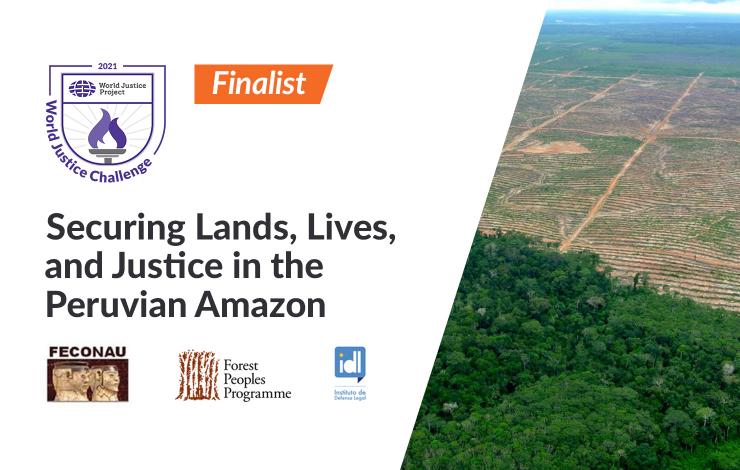
Forest Peoples Programme, The Federation of Native Communities of Ucayali, and The Institute of Legal Defense | Peru
Fundamental Rights and Non-Discrimination
-
The Shipibo-Konibo Indigenous community of Santa Clara de Uchunya is struggling against the dispossession and deforestation of their ancestral lands due to the aggressive expansion of oil palm.
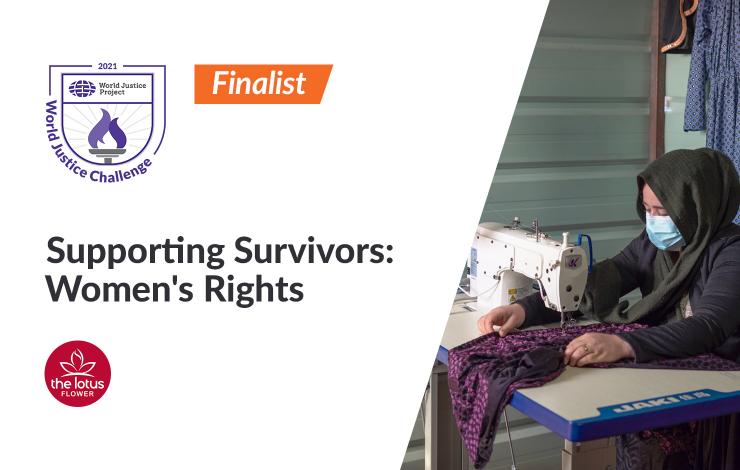
The Lotus Flower | Iraq
Access to Justice for All
-
Our project is designed to increase capacity for remote and online support for female ISIS survivors who have been most severely impacted by COVID-19.
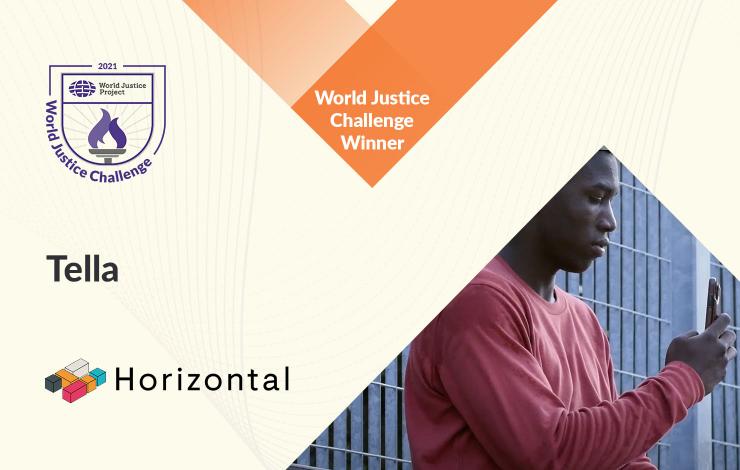
Horizontal | United States/Global/Myanmar/Belarus
Accountable Governance
-
Tella is a documentation app for mobile devices. In challenging environments, with limited or no internet connectivity or in the face of repression, Tella makes it easier and safer to document events, whether that's violence, human rights violations, corruption, or electoral fraud.
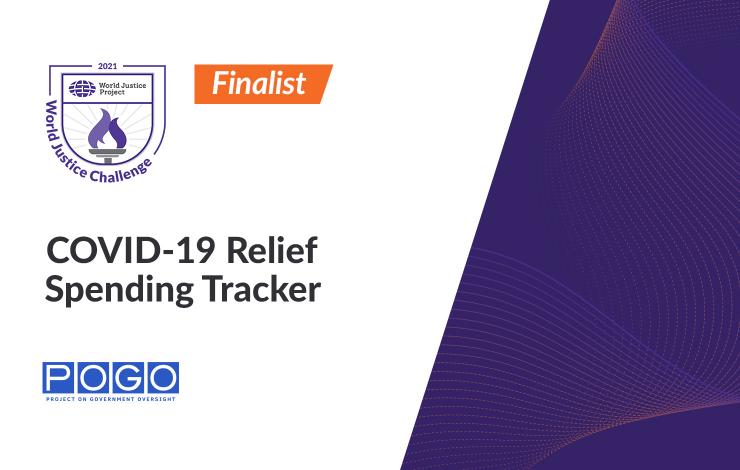
Project On Government Oversight | United States
Anti-Corruption and Open Government
-
POGO launched a COVID-19 relief spending tracker that includes over 15 million transactions, accounting for $1.6 trillion in assistance, the largest picture of United States federal spending on the COVID-19 crisis available.
